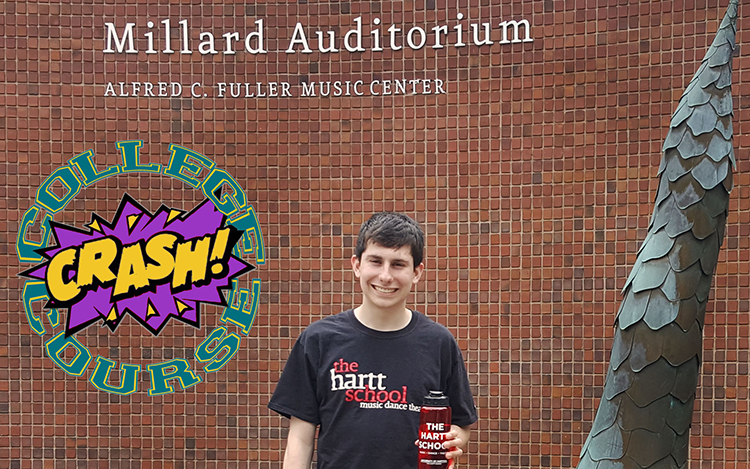
SAGEbroadview’s Crash Course in College Admissions Part III: Applying for Performing Arts Programs

Shakespeare may have been right when he penned, “All the world’s a stage.” But as Sheri, her husband Dave and their youngest son Devon have discovered, an aspiring performing arts student will still find the college admissions process even more challenging as a result of extra audition and other specialized requirements.
Following is Sheri’s advice for families of students who are interested in entering performing arts programs, like the one Devon has selected as he pursues his major in Percussion Performance and Composition.
The college application process was so much harder and longer for Devon than what we went through when our older son Dominic applied to college two years ago to study Robotics Engineering. As a Music Performance and Composition Major, we found Devon’s college selection involved a three-part process:
- Applying Academically. Devon needed to apply academically, just as you would for any major. The application included the usual essay requirements, along with sending a transcript, submitting SAT/ACT scores, and gathering academic letters of recommendation. In other words, we second all of the same advice that Lynn shared in her post about her daughter Sarah’s application.
- Applying Musically. Devon also needed to submit musical applications to his programs of choice. Typically, this involved sending his resume, repertoire list and artistic letters of recommendation, and completing additional essays and questionnaires.
- Auditioning. Last but not least, Devon had to demonstrate that he could actually perform.

Devon getting ready to conduct his orchestral composition “Amalgamate“
The Search
In initiating his search, Devon began by polling many of the professional musicians he knows. He also asked his high school music teachers for their opinions. Then we did some research on the college sites to narrow down the list. Here are some tips we’d recommend for your student’s sophomore and junior years in high school:
- Just as Lynn suggested, start visiting the schools in which you are interested. Don’t wait until the last minute or you’ll end up feeling rushed.
- Ask the professors at these schools for a free lesson. Your child prodigy will likely study with the same professor for all four years, so compatibility is important.
- Ask to attend classes and rehearsals with some current students at each school, so you can get a better feel for the place.
Auditioning Ideas
As “luck” would have it, we were scheduling Devon’s auditions in the midst of some of those huge winter storms we’ve been experiencing lately. The biggest lesson we learned from that is how important it is to schedule your auditions early in the application process. You not only need to juggle known events such as other college and high school performances, but you want it to be easier to reschedule if the unexpected occurs. If you push all of your auditions toward the end of the audition calendar (typically during the wintry months of December–February), there may not be any available make-up dates if a foot or two of snow gets in your way.
We also found it helpful to enter every date, including travel time, in our busy family calendar.
Some other tips on auditioning:
- Determine requirements for your instrument by researching the college’s website. Here’s an example.
- Note that some colleges pre-screen by requesting a video of your child performing a couple audition pieces. If they like what they see, you are invited to audition in person.
- Bring a notebook for the audition committee with tabs for each piece of music being performed, a resume and your repertoire. Some schools also asked for Devon’s high school transcript.
- Be prepared for an interview with the professor/committee who is conducting the audition. Come prepared with a list of questions, including some customized to the school.
Preparation Strategies
- Practice, practice, practice. Devon tried to practice three hours each and every day.
- Ideally work with a private teacher weekly, to hone your audition program.
- Attend a “How to Prepare for College Auditions” program at a local college.
- Perform your program in front of as many people as you can before you audition at the colleges. Invite your high school music teachers as well as friends and family to watch.
- Show up to the audition dressed nicely and neatly, but make sure you are comfortable. (Learn from our mistake: Don’t leave your dress bag hanging on your closet door when you are four hours away from home! We realized we’d done this late one night before an early-morning audition. Devon’s dad made a heroic, last-minute dash to a local department store to buy clothes and shoes while Devon and I checked in at the college. Then Devon did a quick change in the bathroom. Stressful!)
- A few mistakes are okay and expected; professors will watch to see how you handle them. An audition is about your potential to be a great college student and musician.
- That said, the quality of your audition can influence your merit scholarship offers. If you get competing offers, don’t hesitate to share them politely and respectfully with the other schools. You might receive an increase in your awards if they really want you.
- Once you decide where you will attend, write each professor from the rest of the schools to personally thank them for accepting you. It’s a small, tight community so keep those lines of communication open. Let them know that you regret that you will not be studying with them now, but that you hope to cross paths again in the future.

Devon playing on glockenspiel with Mantra Youth Percussion in Times Square.
Devon’s Promising Future
Devon applied to seven colleges and was accepted to each one, receiving a number of generous merit scholarships. It was a very difficult decision for him, as he found that each percussion professor had so much to offer and was very giving of his time and talents.
Of course, ultimately, he had to make a decision. Devon will be studying at The Hartt School at the University of Hartford, in their five-year double-major program, studying Percussion Performance and Composition. As a bonus for me, Hartt is very close to our Farmington, CT office. (But I promise to always warn Devon before I come visit!)
Look out, world!
 Secure Document Sharing
Secure Document Sharing


